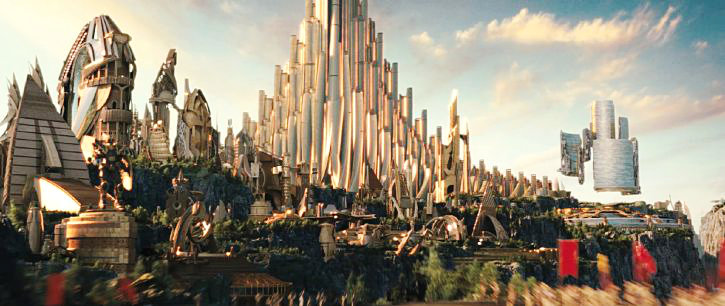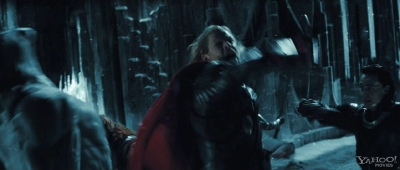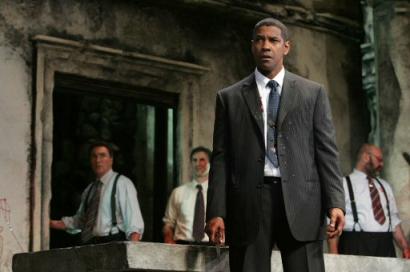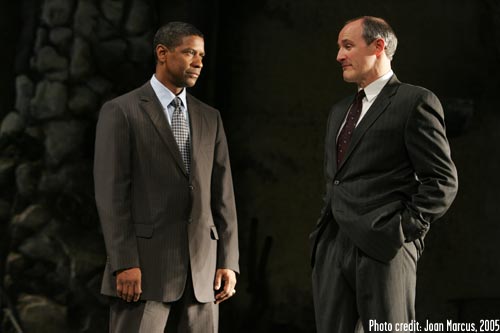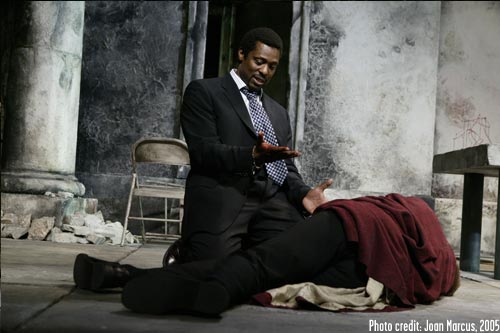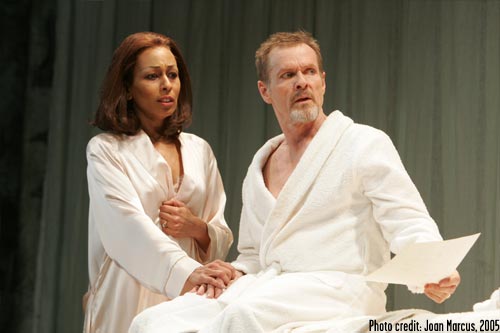
Well, I’m sure it helped that, between the series of underwhelming trailers and the general hokiness of the source material, I went in with expectations calibrated at about shin-level. Still, I was surprised to discover this past Friday that Kenneth Branagh’s corny but amiable adaptation of Marvel’s Thor — which I caught IN THREE DIMENSIONS (the third of which adds next to nothing, by the way; save your money) — is totally and utterly not-bad.
That may seem like I’m damning this first of four comic book tentpoles this summer — along with X-Men: First Class, Green Lantern, and Captain America: The First Avenger — with faint praise. But, hey, sometimes ok is a good thing. There’s not much reaching for depth here: Branagh’s Thor is smart and self-referential enough to know that, once you get past all the family strife, Norse brooding, hubris of Gods, and whatnot, this is just a breezy, early-May popcorn film, and it keeps a light touch accordingly. The Dark Knight, this isn’t.
As such, and perhaps not surprisingly, Thor — the story of a fallen deity’s misadventures in the American Southwest, and the brother who betrayed him back home — feels more in keeping with the Make-Mine-Marvel larkiness of Iron Man. (And although IM was a much better film, Thor is more successful and self-contained a story than the rush job that was Iron Man 2.)
Like Iron Man, Thor is a comic that — Walt Simonson’s epic run in the 80’s notwithstanding — I’ve remained mostly agnostic about over the years. With all due respect to the Nordic pantheon from whence he came, Thor has just never been all-that-interesting a comic book character to me. He’s…a guy…with a hammer. Nor, for that matter, are his powers very well-defined. So, ok, he’s strong and can kinda sorta control the weather. But there’re a lot of generic strongmen running around the Marvel universe — Hulk, Hercules, Colossus, Juggernaut. What makes Thor different?
With that in mind, Branagh and his team of screenwriters make the smart move of dropping the “trapped as mere mortal Dr. Donald Blake” part of Thor’s origin and taking what’s distinctive about the character — mainly, his Asgardian roots and his noble, if a bit dense, nature — to fashion a fish-out-of-water story instead. Most of the humor that keeps the movie humming along — say, Thor going to the pet store to find a Lockjaw-type large steed on which to ride through the desert — ensues from this wise decision to skip canon and tell a rollicking Thor story (Thory?) instead.
The film also benefits from a bevy of actors, including but by no means limited to Chris “Papa Kirk” Hemsworth as the titular thunder god, who can managed the dual feat of conveying comic book gravitas when it is required and delivering moments of pure cheese with a wink and a nod. Anthony Hopkins, of course, is an old hand at this sort of thing by now, but his Odin is matched well by Tom Hiddleston’s impressive turn as Loki, the God of Mischief. (Let’s face it, Loki was always a more interesting character than Thor anyway, almost by design, and perhaps the most visceral geek thrill I got out of Thor was seeing Hiddleston — in the iconic horned helmet — lounging on Asgard’s throne like something out of Milton.) And a number of other actors here match the same wry and knowing tone perfectly, from Idris Elba’s Heimdall to Clark Gregg’s ubiquitous Agent of S.H.I.E.L.D to Stellan Skargard, here in the often-thankless role of skeptical science guy/mentor to the love interest.
Speaking of the love interest, Natalie Portman continues her post-Black Swan year-of-many-films here as super-physicist Jane Foster, and she’s decent enough at it. At the very least she doesn’t exhibit the deer-in-a-headlights stare that accompanied her last venture into FX-heavy fandom, the prequels. If there’s a weak link here, it’s probably — and sadly — Rome‘s Ray Stevenson (who already did time in the Marvelverse as the Punisher, in the one with McNutty) as Volstagg of the Warriors Three, a.k.a. Falstaff in the comics, Gimli in this film. I like Stevenson, but he’s mostly just miscast here. A more rotund individual (Oliver Platt? Mark Addy?) probably could’ve sold the character better.
Still, the very fact that the Warriors Three are traipsing around the margins of a big summer movie just goes to show what an embarrassment of riches comic book fans are enjoying at the multiplex these days. Even if I’m not much of a fan of Thor per se, I have to admit I definitely enjoy watching the world-building Marvel is engaged in as a studio right now. (Here, various Marvel denizens are name-dropped, and another Avenger shows up briefly mid-movie — You’ll know him when you see him.)
Like the comics they’re based on, these pre-Avengers films have permeable borders. It’s like nothing we’ve seen before at the cinema, and the ambition is thrilling. Of course, there will be a backlash eventually — one of these comic book films is going to bomb, and bomb big. But, surprisingly to me at least, Thor doesn’t signify the end is near. To the contrary, it shows that if you get a good director, good writers, and good actors who take their source seriously — but not too seriously — the comic book experience is actually pretty translatable to the big screen. The ball’s in your court now, Hal Jordan.
